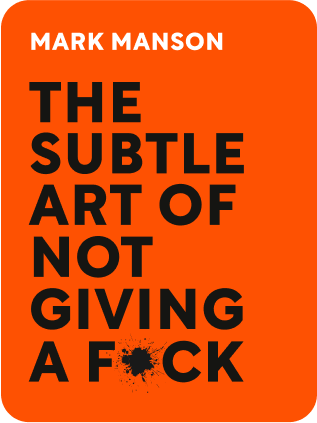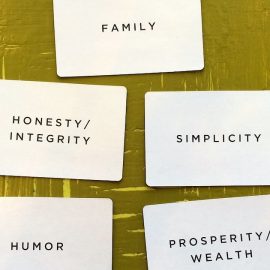

This article is an excerpt from the Shortform book guide to "The Subtle Art of Not Giving a F*ck" by Mark Manson. Shortform has the world's best summaries and analyses of books you should be reading.
Like this article? Sign up for a free trial here .
Do you feel helpless or victimized when you’re faced with problems that are out of your control? How can learning to take responsibility for any situation change your mindset?
In The Subtle Art of Not Giving a F*ck, Mark Manson says that you need to learn responsibility in order to be happy. Only when you accept your ability to make choices, even in the worst situations, will you be happier and feel more in control.
Keep reading to learn what Mark Manson has to say about learning responsibility.
Learning Responsibility
When you don’t feel in control of a situation, you become unhappy. However, according to Manson, it’s often a matter of perspective: A difficult problem can make you miserable, or it can give you a sense of accomplishment when you solve it.
Often, the only difference is in the degree to which you’re responsible for the situation or feel you have a choice in it. We feel in control and empowered when we choose our problems or challenges; when forced to deal with problems not of our making, we feel helpless and victimized.
But here’s Manson’s solution: No matter what situation you’re in, no matter your circumstances, you always have a choice. You can choose what you think, and how you behave in every situation. Once you learn responsibility and accept your ability to make choices, you’ll feel empowered in any situation, and this will make you happier.
Even in the worst situations—for example, being stuck in the hospital, or in prison—your attitude and your behavior are your choice and your responsibility.
| Discipline (or self-control) is one of the values that Robin Sharma teaches in The Monk Who Sold His Ferrari. He makes the case that chasing after your whims doesn’t make you powerful or free; on the contrary, it makes you a slave to your own desires. Therefore, he urges you to study your desires and only act on those that are worthwhile—namely, your desires to grow and improve yourself. According to Sharma—and Manson—true freedom and power lie in having the discipline to make your own decisions, instead of being pushed along by outside forces like desire. |
You’re Always Making Choices
Manson says that, while we don’t always control what happens to us, we’re always responsible for how we respond to it.
In any situation, you have more choices than you think:
- You choose the values and standards you live by.
- You choose how to interpret what happens and how to respond.
Manson also points out that you actually can’t avoid responsibility—even choosing not to respond to something is a response, and you’re responsible for it. Therefore, the question isn’t whether or not you should decide to take responsibility; the question is what values you’ll base your decisions on.
In other words, what will you give a f*ck about?
| The Benefits of Values-Based Decisions Knowing your values and sticking to them has a number of benefits. For example, Forbes interviewed 12 CEOs about how values-based decisions have helped their companies. Some of the responses included: Clarity. Clearly defined values help with decision-making, because any given decision becomes a simple question of whether it goes against one of those values. Efficiency. Clear values lead to clear goals. In turn, clear goals stop you from overextending yourself trying to chase every passing whim. You can use your resources (time, money, energy, and so on) effectively and efficiently. Transparency. When people know what your values are, they’ll find you more trustworthy. Furthermore, they’ll find it easier to anticipate what you’d want in any given situation—therefore, you’ll find that people are more helpful and accommodating when your values are clear. Being true to yourself. Defining your values and living by them is the best way (perhaps the only way) to become the person you want to be. Looking at it another way: You have to know what your goal is before you can reach it. Defining your values will allow you to set meaningful goals for yourself. |
Responsibility Versus Blame
Manson believes that the more responsibility we assume for what happens in our lives, the more power and control we have. Thus, taking responsibility is the first step toward solving our problems.
Furthermore, it’s a common misconception that taking responsibility for something means taking the blame for it, but responsibility and blame are different things. We aren’t to blame for everything that happens to us (for instance, a traumatic childhood), but we’re still responsible for how we respond to it.
(Shortform note: When approaching this concept, you might find it helpful to replace the word “blame” with “fault.” Your current situation (whatever it is) might not be your fault; however, dealing with it is still your responsibility.)
Manson stresses that you alone are responsible for your circumstances. Others may have contributed to the situation, but you’re responsible for your unhappiness because you’re choosing how to react to and frame the situation.
For example, suppose somebody robs you in a bad part of town. The robber is responsible for that event, but not for how you feel about it. Only you can make yourself happy again; you can decide to accept what happened (a value) and learn a lesson (why did I get robbed? How can I avoid similar situations in the future?).
| Attribution Error Mislabels Blame One way that people commonly avoid taking responsibility is through attribution error (also called attribution bias). Basically, people tend to attribute their own shortcomings to circumstance (losing a job because “the manager hates me,” for example), and other people’s shortcomings to character flaws like laziness or carelessness. In How to Stop Worrying and Start Living, Dale Carnegie suggests that you treat others with the same tolerance you have for yourself—assume that what they do is the result of circumstance, rather than poor character. However, Manson takes this one step further by saying that you shouldn’t assume your shortcomings are because of circumstance. Taking Manson and Carnegie’s ideas together, we’d end up with a sort of “reverse attribution bias,” wherein we assume that our own problems are due to our choices, while others’ are due to their circumstances. Interestingly, that closely resembles Marcus Aurelius’s insistence that we should be strict with ourselves, but patient with others. |
Manson offers another way to approach this concept: Blame exists in the past, while responsibility exists in the present. In other words, when you blame someone (including yourself), you’re focused on the past: ”How did this situation happen?” When you take responsibility, you’re focused on the present: What are you going to do about it?
Furthermore, blame is destructive—it serves no purpose except to make someone feel bad. However, responsibility is constructive—it drives you to find and implement solutions.
| In Meditations, Marcus Aurelius offers two compelling arguments against the very concept of blame (or fault): Blame is pointless. People make mistakes and hurt others due to ignorance or accident, not out of malice. There’s no sense in blaming people (including yourself) for what they don’t know, or for an honest mistake. Instead, you should teach them (or learn) how to avoid that problem in the future. Blame is useless. Even if there were someone to blame for a situation, doing so wouldn’t fix the problem. The only rational approach is to find a solution and work to implement it. |

———End of Preview———
Like what you just read? Read the rest of the world's best book summary and analysis of Mark Manson's "The Subtle Art of Not Giving a F*ck" at Shortform .
Here's what you'll find in our full The Subtle Art of Not Giving a F*ck summary :
- How to clarify what's important to you (and not just what you think should be important)
- Why it's okay for things to not always go well in life
- Why you need to care about fewer things






